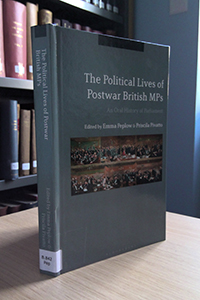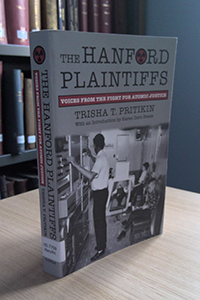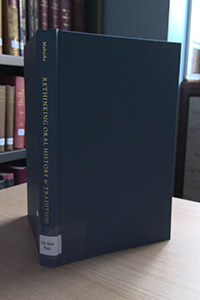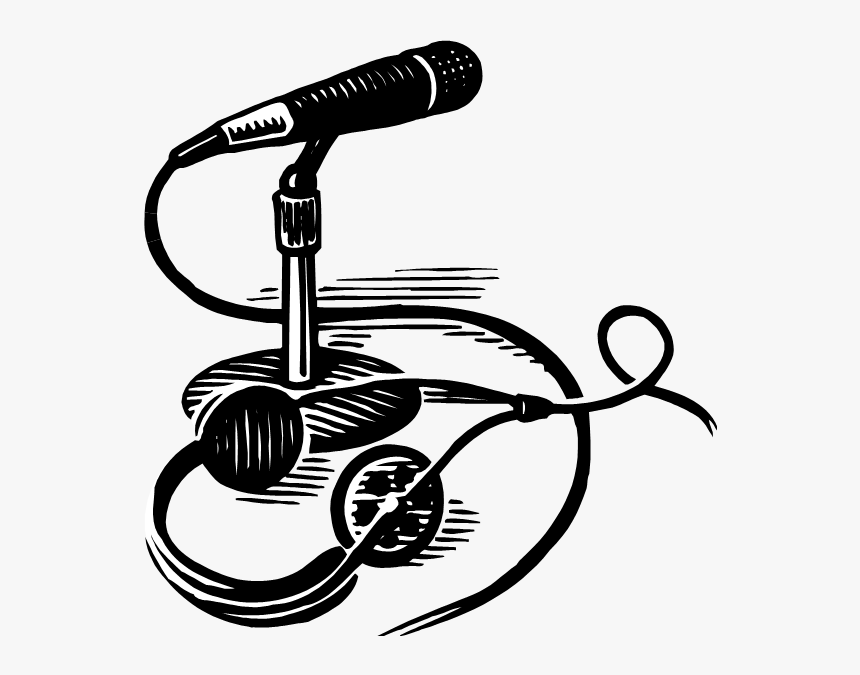This post was written by Alex Kither, Graduate Trainee Library Assistant at the Institute of Historical Research.
Despite the lockdown, our collections continue to expand. Over the month of January, the Wohl Library has strengthened several important areas of our collections. We have acquired four more volumes of the Oxford Works of W.E.B. Du Bois, which we hope to obtain a complete set within the coming months. We have also added several important works on twentieth century conflict to our shelves, including Polish and Croatian sources from the second world war, as well as some first-hand accounts from an Edo Samurai, a French Emperor, and a US Supreme Court Justice.
In addition to these items, we have also acquired three important, recently published oral histories. Each text represents a very different voice – post-war British politicians, victims of radiation poisoning and indigenous New Zealanders – yet all three provide a unique and personal insight into the lived experiences, memories, and practices of their respective subjects.
The political lives of postwar British MPs : an oral history of parliament
Emma Peplow and Priscila Pivatto. (London, 2020)
 In this text, Peplow and Pivatto present a broad selection of personal insights and reflections on the political lives and careers of British MPs from the 1950s – 2000. This study makes extensive use of The History of Parliament Trust’s collection of oral interviews as source material and collates interviews from politicians of all background, party, and experience. Drawing on extracts from interviews with over 160 individual members of parliament, this book studies the careers and lives of MPs in their own words. The volume is divided into five key sections, respectively exploring the individuals’ political backgrounds, their life before the commons, their time as an MP, the development of their personal politics and reflections on their own political careers. Cumulatively, these interviews present an important contribution to the history of modern parliament and provide new perspectives on British governance in the latter half of the twentieth century. Including a glossary of MPs, bibliography and index, this work offers a rare human insight into the lives of those who governed Britain between 1950-2000.
In this text, Peplow and Pivatto present a broad selection of personal insights and reflections on the political lives and careers of British MPs from the 1950s – 2000. This study makes extensive use of The History of Parliament Trust’s collection of oral interviews as source material and collates interviews from politicians of all background, party, and experience. Drawing on extracts from interviews with over 160 individual members of parliament, this book studies the careers and lives of MPs in their own words. The volume is divided into five key sections, respectively exploring the individuals’ political backgrounds, their life before the commons, their time as an MP, the development of their personal politics and reflections on their own political careers. Cumulatively, these interviews present an important contribution to the history of modern parliament and provide new perspectives on British governance in the latter half of the twentieth century. Including a glossary of MPs, bibliography and index, this work offers a rare human insight into the lives of those who governed Britain between 1950-2000.
The Hanford plaintiffs: Voices from the fight for atomic justice
Trisha T Pritikin. Foreword by Richard C. Eymann and Tom H. Foulds. (Kansas, 2020).
 Through testimonies and legal process, the Hanford Plaintiffs records the oral histories of the twenty-four individuals who sought recognition and recompense following decades of radioactive contamination of their communities by the Hanford nuclear weapons facility. For nearly four decades, the communities within the vicinity of the Hanford site (initially an outpost of the Manhattan Project) were assured by authorities that the facility posed no threat to life. This assurance proved to be untrue, as the testimonies of those affected describes in chilling detail. A class action lawsuit was filed against the U.S. Government in 1991 and was finally closed in 2015, after 24 years of litigation. This book offers a definitive history of the litigation process through the testimonies of those ‘downwinders’ whose lives were irreparable changed by the effects of the nuclear testing site and urges a broader reconsideration of the cost of nuclear secrecy on public health.
Through testimonies and legal process, the Hanford Plaintiffs records the oral histories of the twenty-four individuals who sought recognition and recompense following decades of radioactive contamination of their communities by the Hanford nuclear weapons facility. For nearly four decades, the communities within the vicinity of the Hanford site (initially an outpost of the Manhattan Project) were assured by authorities that the facility posed no threat to life. This assurance proved to be untrue, as the testimonies of those affected describes in chilling detail. A class action lawsuit was filed against the U.S. Government in 1991 and was finally closed in 2015, after 24 years of litigation. This book offers a definitive history of the litigation process through the testimonies of those ‘downwinders’ whose lives were irreparable changed by the effects of the nuclear testing site and urges a broader reconsideration of the cost of nuclear secrecy on public health.
Rethinking oral history and tradition: an indigenous perspective
Nēpia Mahuika. (New York, 2019)
 Through this text, Mahuika compares various academic approaches to indigenous oral histories and aims to redefine the boundaries of how these histories and traditions are understood through an indigenous perspective. Specifically concerning the historical literature and tradition of native New Zealanders, the book considers the historical value of indigenous oral sources and suggests a methodological approach whereby contemporary scholars can use and understand these sources. The book is accompanied with extensive bibliographical references, glossary, and genealogy tables, as well as an appendix of selected moteatea, waiata and haka. Mahuika urges scholars to revaluate the way their fields consider orality, oral history methods, transmission, narrative, power, ethics, oral history theories and politics and advocates the value of tribally grounded indigenous oral histories in the practice of scholarship today.
Through this text, Mahuika compares various academic approaches to indigenous oral histories and aims to redefine the boundaries of how these histories and traditions are understood through an indigenous perspective. Specifically concerning the historical literature and tradition of native New Zealanders, the book considers the historical value of indigenous oral sources and suggests a methodological approach whereby contemporary scholars can use and understand these sources. The book is accompanied with extensive bibliographical references, glossary, and genealogy tables, as well as an appendix of selected moteatea, waiata and haka. Mahuika urges scholars to revaluate the way their fields consider orality, oral history methods, transmission, narrative, power, ethics, oral history theories and politics and advocates the value of tribally grounded indigenous oral histories in the practice of scholarship today.

